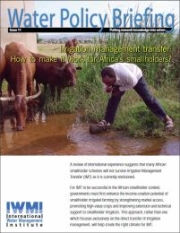Irrigation management transfer:How to make it work for Africa’s smallholders?
Citation:
International Water Management Institute (IWMI) 2003. Irrigation management transfer: how to make it work for Africa’s smallholders? Water Policy Briefing: putting research knowledge into action, Colombo, Sri Lanka: International Water Management Institute (IWMI) 6p. [IWMI Water Policy Briefing 11]
Abstract
Based on research presented in “Institutional Alternatives in African Smallholder Irrigation: :Lessons from International Experience with Irrigation Management Transfer (IWMI Research Report 60)” by Tushaar Shah, Barbara van Koppen, Marna de Lange, Madar Samad, and Douglas Merrey. An international review of IMT experiences shows that for transfer to work, the irrigation system must be central to a wealth-creating agriculture within which IMT makes good economic sense to farmers. This is not the case in a majority of Africa’s smallholder schemes. Making IMT work in this context means addressing a number of challenges: smallholder dependency resulting from years of state intervention in farm operations and management, farmers’ inability to depend on irrigated agriculture as their primary income source, insecure land tenure arrangements, and lack of access to credit and input and output markets Current IMT strategies which focus on investments in capacity-building and infrastructure rehabilitation alone are destined to fail. For IMT to succeed, it must be accompanied by interventions that extend beyond the irrigation sector to significantly enhance African smallholder productivity and incomes. Potential avenues for accomplishing this include strengthening access to markets and credit, promoting high-value crops, improving systems for extension and technical support, making investments in smallholder technologies, clarifying land tenure arrangements, encouraging the development of farm equity schemes, and providing necessary supports through farmers associations.


